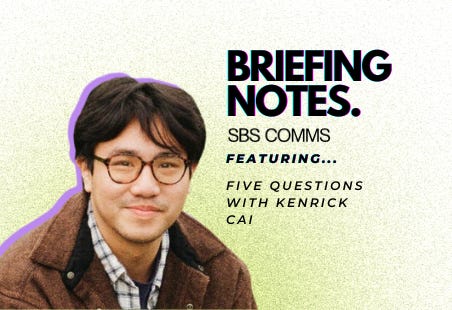Introducing Briefing Notes, a newsletter by SBS
Q&A with Kenrick Cai @ Forbes
As technology communicators and PR pros, we’re used to seeing beyond the hype and breaking through the noise to what really matters. Now, we’re bringing that intel to your LinkedIn feed.
Welcome to Briefing Notes, a newsletter by SBS. Each installment will share our hot takes on the latest developments in tech, as well as a tables-turning interview where we ask top tech and business journalists our burning questions. And we promise it’s written by real PR humans, not ChatGPT.
Comments, feedback, or ideas on who we should interview next can find us at hello@sbscomms.com.
And on that note...
Q1 '23 Media Landscape Update
The tech landscape has shifted quickly this year, with economic conditions rocking the investment and employment landscape, and the emergence of new capabilities forcing a rethink of the sector. Here are two of the biggest themes that have surfaced in 2023, and some of the questions they’re raising in newsrooms across the country:
Artificial Intelligence: With the explosion of ChatGPT, the challenge for newsrooms will be to write about AI in a way that’s fresh, and goes beyond the obvious stories, in order to uncover how the tech will shape the economy, the workplace and society. Here are some of the unanswered questions that will shape coverage in coming months:
What kind of infrastructure makes AI possible, and is it robust enough to support the explosion in this tech? Will this put strain on chip producers, cloud providers, hiring departments and energy providers?
Is this another investment bubble?
What are the practical use cases here, beyond writing, research and search engines?
How will AI shape the future of work? What kind of professions will benefit, and who will be hurt? How should governments, universities and professionals think about preparing themselves for an AI-driven economy?
Global Tech Race: While technology has always been a major strategic consideration, recent headlines about balloon surveillance, chip manufacturing and drone warfare in Ukraine have put increased pressure on countries to protect and stimulate critical industries. This issue is probably sparking the following discussions:
What technologies are considered most strategic, and what can policy makers do to ensure its dominance, in terms of training/attracting talent, ensuring supply chains and manufacturing capabilities won’t get cut off, and procuring the needed raw materials?
What other technologies are we overlooking that have strategic importance, such as quantum computing?
Cost Cutting: We’re also seeing a focus on cost-cutting (something we predicted earlier this year) – The Information had a big story focused on the HR Tech industry, and Big Tech earnings showed that cloud spending is slowing. As we said before, this trend will be one to watch throughout the year, and something savvy PR pros can take advantage of.
In this installment, we talk with Forbes’ Kenrick Cai, who covers tech, startups, and venture capital. While his beat can take many forms, Kenrick prefers to cover “the people or things that cause me to take a step back and think about my own place as a human being in our deeply technological world.”
Please feel free to engage in the conversation and provide feedback, and don’t forget to follow us on Instagram and Twitter.
Five questions with… Kenrick Cai, Forbes
Before we dive into our 5 burning questions, the basics: What’s your beat, and what do you like to cover?
My beat is tech, startups, and venture capital. This could take many different shapes and forms, but I like most to cover the people or things that cause me to take a step back and think about my own place as a human being in our deeply technological world.
What’s your preferred way of working with PR?
I'm cribbing these words from what a PR person once told me, but I think PR is best when it's done such a good job behind the scenes that it feels as though it's invisible. This can apply in different ways, but as an example: interviewing a founder. A flak who's often interjecting to steer an interview raises red flags to me. A flak who's prepped the founder so well that they feel confident to speak with me 1:1 — hats off to them for the prep.
What’s a story you’ve read recently that you wish you’d written?
It's been a few weeks, but TIME's report into how ChatGPT was trained with the help of $2/hour contractors in Kenya to screen for graphic imagery has stuck with me. It was well-reported and really puts us in the shoes of the people being affected by this technology in entirely different and disturbing ways than you or I as end users in America.
What’s the biggest trend that will shape your beat in 2023?
Predictably: AI. This may be the year of AI eating the world. I'm also interested in how this fast-moving technology and the slow-flowing capital work as countervailing forces to affect other industries, where startups and their investors find themselves in more precarious positions.
How has your beat/the industry changed in the past year?
I hope I'm not jinxing it, but recent conversations give me the feeling that Silicon Valley is coming out of its paralysis that took hold for much of the past year. All this "wait and see" talk can't only go on for so long — now, the rubber band is reaching the limits of its elasticity.
What are you reading right now?
One of my toxic traits is I have 10 books open at a time and never end up finishing them all. The last one I picked up is A Mountain to the North, a Lake to the South, Paths to the West, a River to the East by László Krasznahorkai. I enjoy a good labyrinth in my free time.



